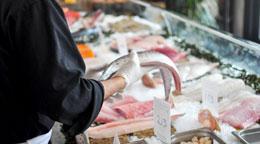Seafood supply chains open to fraud, abuse

By SeaWestNews
An international advocacy group dedicated solely to ocean conservation is once again calling on Ottawa to put a stop to murky global seafood supply chains that allow for overfishing, mislabelling, and forcing seafaring workers to work under unacceptable conditions.
Oceana Canada has also launched a petition campaign calling on the Canadian government to implement fully traceable seafood supply chains.
The group said it has worked with academics who analyzed Canada’s role in fighting human rights abuses in global seafood supply chains, finding that the country is dramatically behind other OECD nations.
“This makes Canadians unwittingly complicit in unacceptable working conditions and forced labour in a range of global fisheries,” said Sayara Thurston, seafood campaigner at Oceana Canada.
“One way to help tackle this is with boat-to-plate seafood traceability. This would help close market doors to fisheries that are not sustainable and rely on underpaid or mistreated workers by blocking the import of seafood products that cannot be traced back to a well-managed fishery,” she said in a statement.
New market research conducted by Abacus Data for Oceana Canada in spring 2022 found that the government is failing to meet Canadians’ expectations for transparent seafood supply chains.
Ninety per cent of Canadians want more information on seafood labels, including the original location of the catch, along with where and how the fish or seafood was caught. Nearly three-quarters of Canadians also feel that the government should take action to prevent seafood from forced labour making its way into Canada, with two-thirds stating they are less likely to purchase a seafood product if they find out that it was the product of forced labour.
In 2019, the federal government pledged to implement boat-to-plate traceability for seafood, and more recently, it further committed to enacting legislation to address the use of forced labour in Canadian supply chains. To date, however, concrete progress has not been made on either commitment, leaving Canada’s seafood supply chains open to fraud and products of illegal practices.
“Canada has made the right commitments to improving transparency in our seafood supply chains, but without action, Canadians have no assurances that products of illegal practices are not still making their way into our country,” said Thurston.
“Canada needs comprehensive legislation that ensures transparent, traceable seafood supply chains. This will have a direct impact on ending overfishing, mislabelling, and forced labour and unacceptable working conditions in the wild-caught fishing industry.
The petition campaign by Oceana Canada follows calls by a coalition of seafood industry leaders, researchers and non-profit organizations, who want Canada to ensure that all seafood sold in the country is honestly labelled, legally caught and fully traceable.
In a letter addressed to three ministers and the Canadian Food Inspection Agency (CFIA), the group is urging the federal government to commit to a timeline on mandating boat-to-plate traceability for seafood sold in the country.
Signed by 26 entities including Buy Low Foods, Sobey’s, Ocean Wise, Nature Canada and the David Suzuki Foundation, the letter expresses concerns that no timeline or plan is in place for implementation of that commitment, two years since it was made.
“People need to know where a fish came from, how it was caught, that the fish is labelled as the correct species and that it is not harmful to human health or the health of ocean ecosystems,” said the group.
“With about 1,700 different seafood species from all over the world now available, it is unrealistic to expect chefs, restaurant owners, retailers and consumers to independently determine that the fish they’re getting is actually the one they paid for.
“In Canada, seafood supply chains lack transparency, which poses health risks, results in millions of dollars lost from the legitimate economy and perpetuates unsustainable production, human rights abuses and destructive illegal, unreported and unregulated fishing.
“With jurisdictions worldwide increasingly requiring electronic data to follow seafood products through the supply chain to safeguard their true identity and point of origin and to ensure legality, Canada is being left behind on seafood traceability,” the group said.
“Your mandate committed to supporting Canadian fishers and the seafood industry with strong traceability, and we have yet to see that support turned into action,” reads the letter addressed to The Canadian ministers of Health, Agriculture and Fisheries and Dr. Siddika Mithani, president of the CFIA.
While traceability is murky in many seafood supply chains, it is not much of a problem in the farmed fish sector said Tim Kennedy, president, and CEO of the Canadian Aquaculture Industry Alliance (CAIA).
“One of the major strengths of Canadian aquaculture is our traceability – we can identify product from “egg to fork” through genetics and labelling,” he told SeaWestNews.
“This is also reinforced by the fact that 95% of Canada’s farmed salmon is globally certified to Best Aquaculture Practices (BAP) or Aquaculture Stewardship Council (ASC) standards that include traceability.
“Canada’s major farmed fish producers are very integrated from hatchery to processing and delivery, so tracking product is quite simple.
“This is another reason why Canadians should look to Canadian farmed seafood products to ensure quality and freshness,” said Kennedy whose organisation represents over 25,000 employees in the seafood farming sector, providing about one-third of the total value of Canada’s fisheries production.









